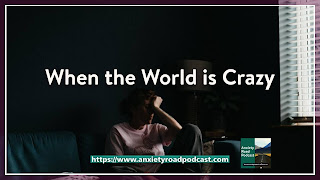There is a term called visceral anxiety. According to various sources, it isn't a medical term but more of a description of feeling anxiety in the lower center of your body. We are talking about the gastrointestinal track.
For some with anxiety it is a persistent problem of pain in the stomach, being gassy or bloated. Or feeling queasy each and every day. (Pregnant people excepted).
Now life happens, you get sick and have those symptoms. Or something you've eaten truly does not agree with your body.
That isn't necessarily anxiety related.
However, if you have constant problems in your gut area AND you have been reviewed by a medical doctor to rule out other health problems then it could be anxiety.
It could be anxiety. And no amount of Maalox or Pepto Bismol is going to fix it.
In this episode, a brief look at gut symptoms and symptom tracking to monitor what is ginning you up.
In this episode, a brief look at gut symptoms and symptom tracking to monitor what is ginning you up.
If you need support contact the National Suicide Prevention Lifeline at 988 or 1-800-273-8255, the Trevor Project at 1-866-488-7386 or text “START” to 741-741.
Bearable app to help you track your symptoms.
Links to other sites are provided for information purposes only and do not constitute endorsements.
Always seek the advice of a qualified health provider with questions you may have regarding a medical or mental health disorder.
This blog and podcast is intended for informational and educational purposes only. Nothing in this program is intended to be a substitute for professional psychological, psychiatric or medical advice, diagnosis, or treatment.
Resources Mentioned:
ADAA.org page on How to Calm an Anxious Stomach: The Brain-Gut Connection
MySymptoms app that can track a wide variety of symptoms. This app was originally created for people that have Irritable Bowl Syndrome but has features that can apply to some anxiety conditions.
Bearable app to help you track your symptoms.
Disclaimer:
Links to other sites are provided for information purposes only and do not constitute endorsements.
Always seek the advice of a qualified health provider with questions you may have regarding a medical or mental health disorder.
This blog and podcast is intended for informational and educational purposes only. Nothing in this program is intended to be a substitute for professional psychological, psychiatric or medical advice, diagnosis, or treatment.










